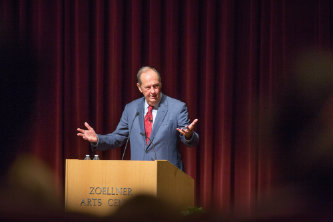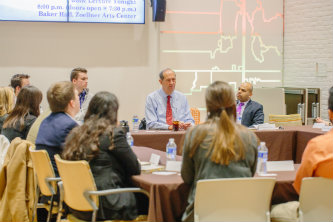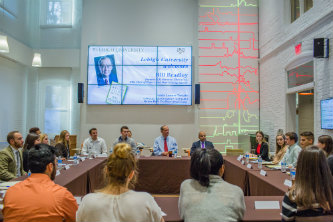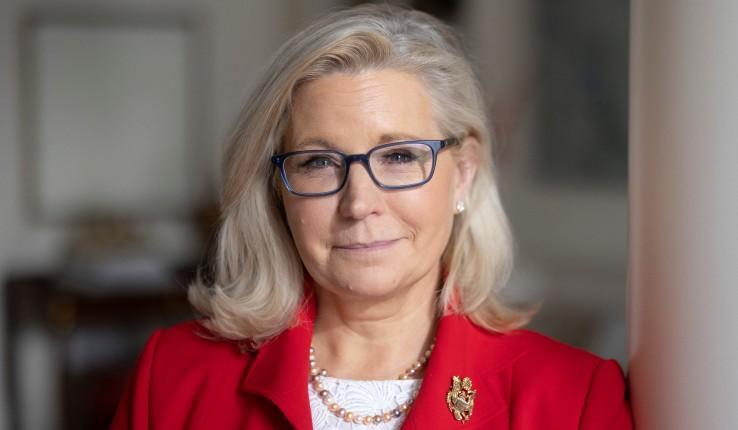'Lead by example'
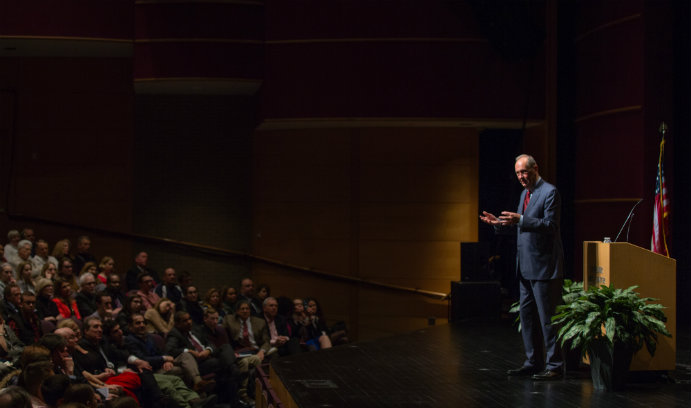
Bill Bradley presented the 2016 Kenner Lecture to a packed audience at Baker Hall.
Former U.S. Senator, Olympian, NBA Hall of Famer and best-selling author Bill Bradley once received a dog in the mail from a disgruntled New York Knicks fan.
Bradley, who played for the Knicks from 1967-1977, described a letter he received from a fan following two losses to the Boston Celtics. The writer threatened to come to Bradley’s house and kill his dog if the team lost to Boston again. Bradley wrote back, telling the fan that he and his teammates were doing their best and that he didn’t have a dog anyway. Three weeks later, Bradley recalled, a UPS truck arrived with a package for him: a dog, accompanied by a note from the fan that read, ‘Bradley, don’t get too attached to this dog.’
“I always thought that was good advice for a politician,” Bradley said with a laugh. “Don’t get too attached to your job.”
With that, Bradley began his delivery of the 2016 Kenner Lecture on Cultural Understanding and Tolerance to a packed audience in Baker Hall Tuesday evening.
The Kenner Lecture Series in the College of Arts and Sciences was endowed by Jeffrey L. Kenner ’65. Kenner, who studied industrial engineering and business administration at Lehigh, established the lecture series in 1997. After a career as a management consultant with PricewaterhouseCoopers (then Price Waterhouse & Co.), he became involved in leveraged buyouts and venture capital. In 1986, Kenner formed his own firm, Kenner & Co. Inc. He served as a university trustee from 1995-2002, has long been a member of the university's Asa Packer and Tower Societies, and is a member of Leadership Plaza.
Bradley represented the state of New Jersey in the U.S. Senate from 1979-1997 and was a candidate for the Democratic nomination for President of the United States in 2000. In addition to playing for the New York Knicks, the Princeton University graduate won gold with the U.S. basketball team in the 1964 Summer Olympics in Tokyo, studied at Oxford University as a Rhodes Scholar, and was elected to the Basketball Hall of Fame in 1983. He has written six books on American politics, culture and economy, including the New York Times bestsellers Time Present, Time Past; The New American Story; and Values of the Game. In his most recent book, We Can All Do Better, Bradley offers a review of the state of our nation.
'Can we do better?'
Donald Hall, dean of the College of Arts and Sciences, introduced Bradley.
“Bill Bradley has been a national leader for more than thirty years and is well known for his hard work, ability to tackle complex issues, his commitment to diversity, and his capacity to affect change. His most recent book, We Can All Do Better, provides a solution to the partisan divide and a path out of the political stalemate in Washington. It is fitting for a lecture addressing understanding intolerance,” said Hall.
Bradley regaled the audience with personal stories and “quick history” lessons to provide context for his thoughts, offering candid insights on the state of America today and what all Americans can do to ensure the future success of our nation.
Writing books, he said, helps him think about public policy and fills a void left in his life since his departure from politics. His weekly Sirius/XM Satellite Radio show, American Voices, allows him to interact with people, another aspect of political life he misses. The stories showcased on the program, Bradley explained, showcase the “goodness of the American people.”
“That is something that we must never forget,” Bradley said. “In the political world, in economic battles ... we must never forget that the foundation of this country is the goodness of the American people. And whatever the policies are, whatever the policy disagreements are, it is that that is important.”
The title of Bradley’s most recent book, We Can All Do Better, quotes Abraham Lincoln, who said in his second State of the Union address, “We can succeed only by concert. It is not ‘Can any of us imagine better?’ but, ‘Can we all do better?’ The dogmas of the quiet past, are inadequate to the stormy present. The occasion is piled high with difficulty, and we must rise—with the occasion. As our case is new, so we must think anew, and act anew. We must disenthrall ourselves, and then we shall save our country.”
“I think that’s a pretty profound statement for us today where we are in the country,” said Bradley. “The politicians in Washington, can they all do better? Yeah. I was once there. I know we can do better. But it’s not simply a matter of them, can they do better? It’s also a matter of each of us asking ourselves, can we do better? Can we be a better parent? Can we be a better grandparent? Can we be a better coworker? Can we be a better citizen? Can we take care of ourselves—physically—better? Can we all do better? And the answer is, in my opinion, yes.”
'We have things to do.'
Bradley explained what he sees as the major problems facing America today. Globalization and the rise of technology, he said, have led to job loss. American infrastructure is crumbling, and our current tax system, he said, requires significant changes.
“Positively we have things to do,” Bradley said. “Why don’t we do them? I would argue we don’t do them because of our politics.”
He described as part of the problem the fundamental conflict between Democrats and Republicans.
“Democrats believe that we have to have caring. Republicans believe that we have responsibility. And that’s the argument—caring, responsibility, caring, responsibility, over and over and over. The truth is we need both,” he said.
In the case of healthcare, for example, caring tells us that every person in America should have access to quality health care, Bradley explained. Responsibility, on the other hand, says the better each person cares for him or herself, the less they will cost the healthcare system and the more money will be available to provide health insurance to all.
“We’ve got to get beyond this dialogue that assumes that one or the other is right and get to the understanding that both are essential to the long-term health of our country,” Bradley said.
Another problem, he said, is campaign financing.
“The reality is the role of money in politics today is corroding our democracy,” he said. “And as with the economy, it’s not rocket science. We have things to do.”
Those things, he said, include public financing of congressional and senatorial elections.
Bradley encouraged long-term thinking and a different approach to foreign policy—keeping borders open, welcoming talented people into America and leading by example.
“I think the way we lead the world is not by yet another military adventure somewhere. ... [It’s] to lead by our example. And that’s what John Quincy Adams wanted to do, what Thomas Jefferson wanted to do: lead by example. That example should be of a pluralistic, multi-racial, multi-ethnic, multi-cultural democracy where people not only vote but participate; the goodness of the American people; the growing economy ... the infrastructure and changes in the taxes. And pluralism is key.”
Bradley concluded with a call to action.
“We need to look in the mirror and ask ourselves, ‘Can we all do better?’ We need to think for the long term. We need to see clearly what our options are and have the discipline to follow them, to understand that caring and responsibility are both required to get us where we want to go. ... We have to understand that pluralism is a tremendous advantage we have,” he said.
“The reality is that America can be on the move again, but to do so, we need to see things clearly. We need to clean up that political system so it’s responsive to people and not the special interests, we need to make decisions that will generate long-term jobs, and we need to understand that it’s our example that sets us apart from the rest of the world.”
Photos by Christa Neu
Posted on:


